英语常用短语的用法与练习
人教版七年级英语下册:第十一单元短语语法归纳练习(含答案)
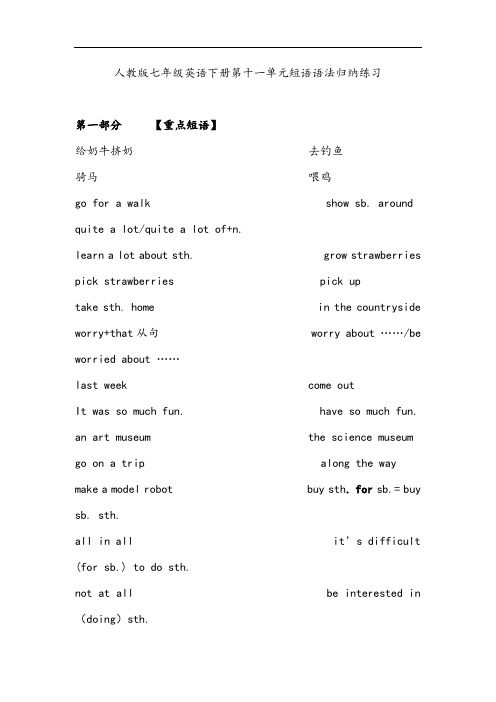
人教版七年级英语下册第十一单元短语语法归纳练习第一部分【重点短语】给奶牛挤奶去钓鱼骑马喂鸡go for a walk show sb. aroundquite a lot/quite a lot of+n.learn a lot about sth. grow strawberriespick strawberries pick uptake sth. home in the countrysideworry+that从句 worry about ……/beworried about ……last week come out It was so much fun. have so much fun. an art museum the science museumgo on a trip along the waymake a model robot buy sth. for sb.= buysb. sth.all in all it’s difficult(for sb.) to do sth.not at all be interested in(doing)sth.【答案】从左至右:milk a cow; go fishing; ride a horse; feed chickens; 去散步=take a walk;带领某人参观;相当多的;关于…学到很多;种草莓;摘草莓;捡起/接某人;带…回家; 在农村;担心……; 担心某人某事;上周;出来/出版/开花;如此有趣;玩得非常开心;一个艺术博物馆;科学博物馆;去旅行;沿途;制作一个机器人模型;为某人买某物;总之;对某人来说做某事很困难;根本不/一点也不;对(做)…感兴趣第二部分【重点语法】一、一般过去时1.定义一般过去时表示过去某个时间或一段时间内发生的动作或状态;也可表示过去经常或反复发生的动作。
e.g.I got up at 7:00 yesterday. 我昨天7点起床。
英语常用短语的用法与练习(13)
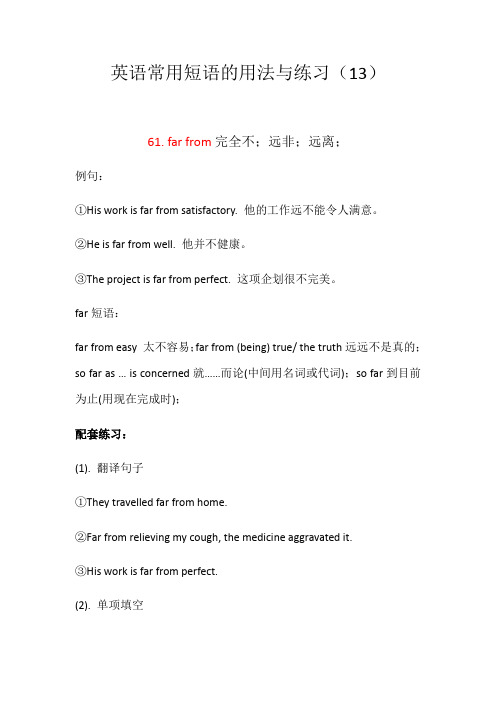
英语常用短语的用法与练习(13)61. far from完全不;远非;远离;例句:①His work is far from satisfactory. 他的工作远不能令人满意。
②He is far from well. 他并不健康。
③The project is far from perfect. 这项企划很不完美。
far短语:far from easy 太不容易;far from (being) true/ the truth远远不是真的;so far as … is concerne d就……而论(中间用名词或代词);so far到目前为止(用现在完成时);配套练习:(1). 翻译句子①They travelled far from home.②Far from relieving my cough, the medicine aggravated it.③His work is far from perfect.(2). 单项填空①She is __________ being pleased about it; she is very angry.A. frequentB. quiteC. far fromD. rather②--- What do you think of the town __________--- Oh, it is very beautiful.A. so farB. by farC. too farD. far and away③They all lived in the village thirty miles _____ from the city.A. awayB. farC. far awayD. faraway④He’s _____ pleased with your workA. far away from far far62. in favour of赞成;支持;有利于;主张;例句:①Could you do me a favour and pick up Sam from school today今天你能帮我个忙去学校接萨姆吗②Both countries seem to favour the agreement. 两个国家似乎都更倾向于这份协议。
英语常用短语的用法与练习(22)

英语常用短语的用法与练习(22)106. Not that Charlie’s own life was easy!然而卓别林自己的生活也并不容易!用法和例句:not that并非,倒不是说,用于句首或短语之前,表否定含义。
如:①Who were you with last night? Not that I care, of course. 你昨晚和谁在一起?我当然不计较。
②She hasn't written to me yet not that she ever said she would.她还没给我来信--倒不是她说过要给我写信。
③There's no pub round here, leastways not that I know of.附近没有酒店,至少据我所知没有。
比较:(1). not because …..., but because ……是用“not ……, but ……”连接两个because 引导的原因状语从句,意思是“不是因为……,而是因为……”。
这一句式只用作状语。
如:I did it not because I liked it but because I had to do it.我做这事不是因为我喜欢它,而是因为我必须做。
(2). not because of ……, but because of ……有时也可连接两个because of短语。
如:He failed in business not because of misfortune, but because of his ownmistakes. 他生意上的失败不是由于遇到了厄运,而是由于他自己的过错。
(3). not that ……, but that……是用“not ……, but ……”连接两个that-clause,意思也是“不是因为……,而是因为……”。
这一句式在句中作状语时,相当于not because …..., but because ……,可以换用。
现在分词短语的用法及例句
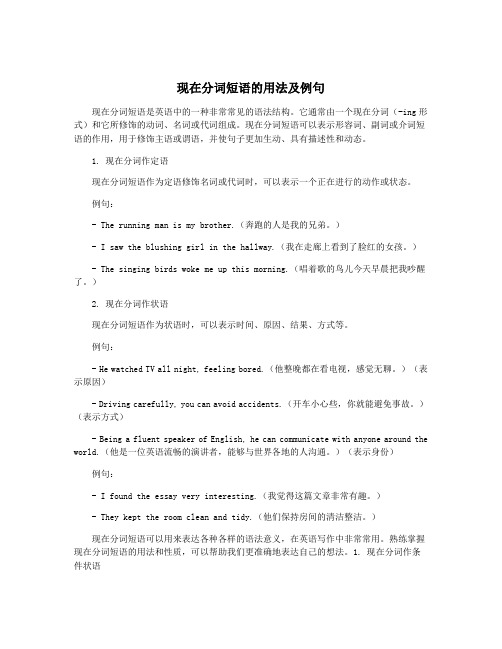
现在分词短语的用法及例句现在分词短语是英语中的一种非常常见的语法结构。
它通常由一个现在分词(-ing形式)和它所修饰的动词、名词或代词组成。
现在分词短语可以表示形容词、副词或介词短语的作用,用于修饰主语或谓语,并使句子更加生动、具有描述性和动态。
1. 现在分词作定语现在分词短语作为定语修饰名词或代词时,可以表示一个正在进行的动作或状态。
例句:- The running man is my brother.(奔跑的人是我的兄弟。
)- I saw the blushing girl in the hallway.(我在走廊上看到了脸红的女孩。
)- The singing birds woke me up this morning.(唱着歌的鸟儿今天早晨把我吵醒了。
)2. 现在分词作状语现在分词短语作为状语时,可以表示时间、原因、结果、方式等。
例句:- He watched TV all night, feeling bored.(他整晚都在看电视,感觉无聊。
)(表示原因)- Driving carefully, you can avoid accidents.(开车小心些,你就能避免事故。
)(表示方式)- Being a fluent speaker of English, he can communicate with anyone around the world.(他是一位英语流畅的演讲者,能够与世界各地的人沟通。
)(表示身份)例句:- I found the essay very interesting.(我觉得这篇文章非常有趣。
)- They kept the room clean and tidy.(他们保持房间的清洁整洁。
)现在分词短语可以用来表达各种各样的语法意义,在英语写作中非常常用。
熟练掌握现在分词短语的用法和性质,可以帮助我们更准确地表达自己的想法。
1. 现在分词作条件状语当现在分词短语与 if 或 when 连用时,可以表示一个条件或情况。
初中重要英语短语用法汇总
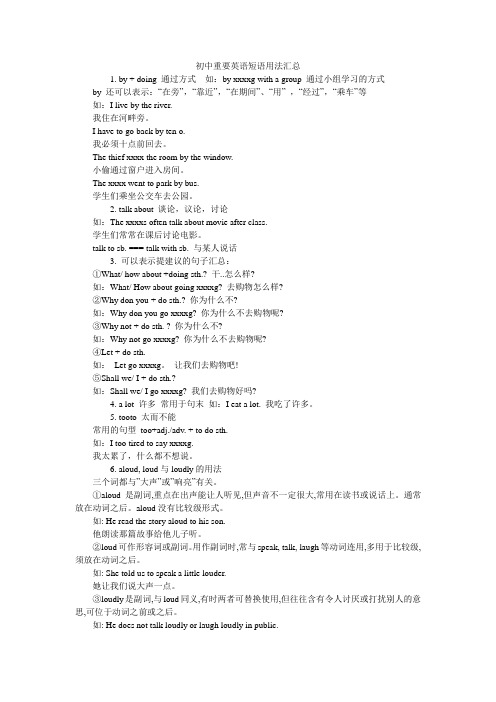
初中重要英语短语用法汇总1. by + doing 通过方式如:by xxxxg with a group 通过小组学习的方式by 还可以表示:“在旁”,“靠近”,“在期间”、“用” ,“经过”,“乘车”等如:I live by the river.我住在河畔旁。
I have to go back by ten o.我必须十点前回去。
The thief xxxx the room by the window.小偷通过窗户进入房间。
The xxxx went to park by bus.学生们乘坐公交车去公园。
2. talk about 谈论,议论,讨论如:The xxxxs often talk about movie after class.学生们常常在课后讨论电影。
talk to sb. === talk with sb. 与某人说话3. 可以表示提建议的句子汇总:①What/ how about +doing sth.? 干..怎么样?如:What/ How about going xxxxg? 去购物怎么样?②Why don you + do sth.? 你为什么不?如:Why don you go xxxxg? 你为什么不去购物呢?③Why not + do sth. ? 你为什么不?如:Why not go xxxxg? 你为什么不去购物呢?④Let + do sth.如:Let go xxxxg。
让我们去购物吧!⑤Shall we/ I + do sth.?如:Shall we/ I go xxxxg? 我们去购物好吗?4. a lot 许多常用于句末如:I eat a lot. 我吃了许多。
5. tooto 太而不能常用的句型too+adj./adv. + to do sth.如:I too tired to say xxxxg.我太累了,什么都不想说。
6. aloud, loud与loudly的用法三个词都与”大声”或”响亮”有关。
中学常用英语短语300个(16)

英语常用短语的用法与练习(56)276、drop off 下降;减少;打盹;打瞌睡;让某人下车;下降;减少;打盹;打瞌睡;让某人下车;例句:①I dropped off and missed the end of the film.我打了个盹儿,错过了影片的结尾。
我打了个盹儿,错过了影片的结尾。
②Drop me off at the next stop.请让我在下一站下车。
请让我在下一站下车。
③Interest in the book began to drop off.人们对这本书的兴趣开始减退了。
人们对这本书的兴趣开始减退了。
短语:drop out (of...)辍学,退出,脱落;drop away 逐渐下降;减少;drop in 拜访;drop behind/back 落后;掉队;drop sb. a line 给某人写信;给某人写信; 配套练习:(1). 单项填空:单项填空:①My top button has dropped _____ and I can't find it .A. inB. awayC.outD.off②The number of students has been dropping _____ recently .A.outB. offC. inD.away③He said he would drop the parcel _____ at the post office .A. outB.awayC. offD. in④I was just dropping _____ when the telephone rang .A. inB. offC.outD. away(2). 完成句子完成句子①詹姆斯开始攻读工程学学位,但仅一年后就辍学了。
①詹姆斯开始攻读工程学学位,但仅一年后就辍学了。
James started an engineering degree but __________ after only a year.②我曾想路过时顺便来看看你。
常用英语短语的用法总结
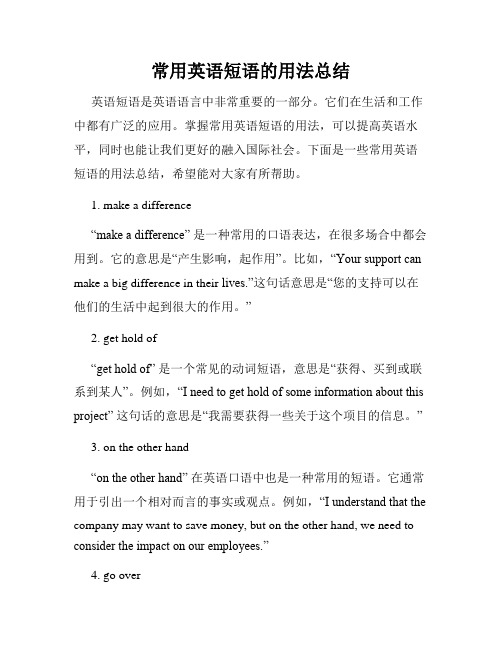
常用英语短语的用法总结英语短语是英语语言中非常重要的一部分。
它们在生活和工作中都有广泛的应用。
掌握常用英语短语的用法,可以提高英语水平,同时也能让我们更好的融入国际社会。
下面是一些常用英语短语的用法总结,希望能对大家有所帮助。
1. make a difference“make a difference” 是一种常用的口语表达,在很多场合中都会用到。
它的意思是“产生影响,起作用”。
比如,“Your support can make a big difference in their lives.”这句话意思是“您的支持可以在他们的生活中起到很大的作用。
”2. get hold of“get hold of” 是一个常见的动词短语,意思是“获得、买到或联系到某人”。
例如,“I need to get hold of some information about this project” 这句话的意思是“我需要获得一些关于这个项目的信息。
”3. on the other hand“on the other hand” 在英语口语中也是一种常用的短语。
它通常用于引出一个相对而言的事实或观点。
例如,“I understand that the company may want to save money, but on the other hand, we need to consider the impact on our employees.”4. go over“go over” 是一个常用的动词短语,意思是“检查,复习”。
例如,“Before you submit the report, please go over it one more time to make sur e there are no mistakes.”5. by the way“by the way” 是一种常见的短语,在口语和书面语中都可以使用。
英语常用短语的用法与练习(21)

英语常用短语的用法与练习(21)101. as a matter of fact 其实,事实上;例句:①It was cold. As a matter of fact, it was freezing.天很冷。
事实上,冷得要命。
②As a matter of fact, business has come to a stop.事实上, 业务已停止了.③It's not that difficult. As a matter of fact, it'squite easy.这并不那么困难,实际上,容易得很。
matter短语:as a matter of fact=in fact/in actual fact/actually/in reality/to tell the truth 实际上;事实上,用以加强语气;to make matters worse 让事情更糟糕的是;it doesn’t matter 没有关系;用法:actually、as a matter of fact、in fact的意义是完全一样的,词性也一样,都是副词。
稍微有点不同的地方,只在于actually可以修饰形容词,动词,或者其他副词,或者一个句子,而另外两个只能修饰一个句子,并且通常放在句首。
配套练习:单项填空①It rained that day. _____ , our car broke down on the way.A. In factB. ActuallyC. To make matters worseD. To tell the truth②It will be a big help if you go to the store and get what we need for dinner. ______, I’ll set the table.A. As a resultB. On the wholeC. In the meanwhileD. As a matter of fact③Charlie thinks money will _____ all his problem, but as a matter of fact he is mistaken.A. work outB. solveC. provideD. supply④___, I don’t mind, but you should have asked me first.A. For the matterB. In the matter ofC. As a matter of factD. On the matter102. in memory of=to the memory of 纪念;追念;例句:①Many ceremonies are in memory of famous people.很多典礼是为了纪念名人的。
英语常用短语的用法与练习
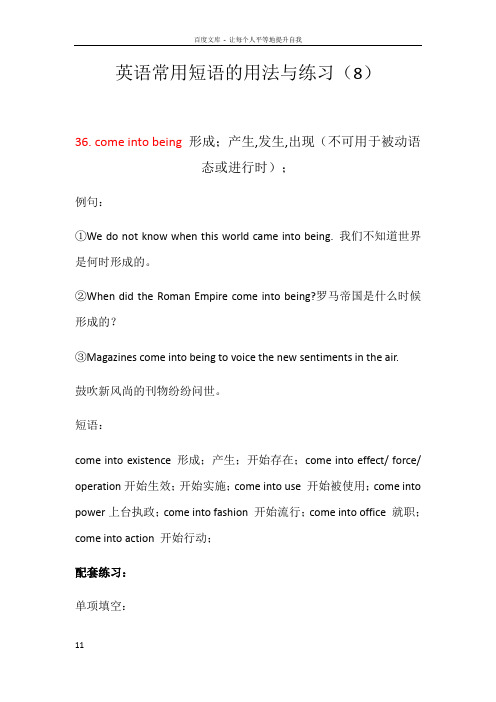
英语常用短语的用法与练习(8)36. come into being 形成;产生,发生,出现(不可用于被动语态或进行时);例句:①We do not know when this world came into being. 我们不知道世界是何时形成的。
②When did the Roman Empire come into being?罗马帝国是什么时候形成的?③Magazines come into being to voice the new sentiments in the air.鼓吹新风尚的刊物纷纷问世。
短语:come into existence 形成;产生;开始存在;come into effect/ force/ operation开始生效;开始实施;come into use 开始被使用;come into power上台执政;come into fashion 开始流行;come into office 就职;come into action 开始行动;配套练习:单项填空:①Before the computer ____ , people could never imagine it could bring about such great changes to human life.A. came into beingB. was discoveredC. was come into beingD. was formed②Once a bad man comes into _____, the people of that country will suffer a lot.A. energyB. officeC. powerD. nation③It is said that this old building has _____ for more than three hundred years.A.existedB.appearedC.been builte into being④Do you know when did the world _____?A. come into beingB. comeC. formedD. existed37. come to life 复活;苏醒;变得活跃;恢复生气;例句:①I love to watch everything come to life in spring. 我喜欢看到春天万象更新。
英语常用短语地用法与练习(9)

英语常用短语的用法与练习(9)41. be in good/poor condition状况很好(坏);状况很好(坏);例句:①T he ship is not in a condition/is in no condition to make a long voyage.此船的状不适合航。
②T he car is still in excellent condition. 汽状况极佳。
condition 短:out of condition 状况欠佳; working/living/studying conditions 工作 / 生活/ 学境; on condition (that)... 在⋯⋯条件下;若是⋯⋯; on nocondition 一点也不 ; 决不; in excellent condition 于极佳的状况;配套:(1).用适合的介填空①T he car has been well maintained and is _____ excellent condition.②H e’s_____ excellent condition _____ a man of his age.③I had no exercise for ages;’mI really _____ of condition.④Y ou can go out _____ condition that you wear an overcoat.(2).填空:①T hey supplied me good living ___, so I had ___ happy experience.A. conditions; aB. condition; aC. conditions; /D. condition; /②K eep your car in good ___ and it will drive long.A. instructionB. positionC. conditionD. situation③S he is in a poor ___ of health, which worries her mother much.A. positionB. situationC. stateD. condition④S he stepped into the bedroom quietly ___ she might wake up her roommates.A. for fear thatB. so long asC. on condition thatD. in order that42. connect with ...与⋯⋯接;系起来;例句:①T he room connects with the dining hall by means of hallway.个房通一条道与餐相。
英语常用短语的用法与练习(2)

英语常用短语的用法与练习(2)6. after all毕竟,终究;用法:after all有两个用法:(1).人表示“毕竞”,“终究”,“到底”,含有和预期的情况相反或“虽然.,但还是….”的让步意义.表示此意时,after all 一般放句末.如:So you did come after all.这么说你到底还是来了. (2).表示“别忘了……,”“总之.”“毕竟”,这时的after all一般故在句首,用来提醒对方(听话的人)似乎忘记了一个重要事实,忽略了某个重要的理由或论点.如:Why is he not allowed to stay here?After all,It's his home.例句:①Don’t get discouraged by setbacks, we are new to the work after all.别因挫折而灰心,毕竟我们不熟悉这项工作。
②He did come after all. 他终究还是来了。
短语:at all根本,完全;到底,究竟;既然;not at all一点也不;in all总共,共计;above all首先;最重要的是;first of all 首先;all in all总之;配套练习:单项填空①The hurricane damaged many houses and business buildings; ____ , itcaused 20 deaths.A. or elseB. thereforeC. after allD. besides②I’d like to buy a house—modern, comfortable, and ____ in a quiet neighbourhood.A. in allB. above allC. after allD. at all③People may have different opinions about Karen, but I admire her. ____, she is a great musician.A. After allB. As a resultC. In other wordsD. As usual④-- I am sorry I didn't do a good job.-- Never mind. ____, you have tried your best.A. Above allB. In allC. At allD. After all7. all in all 极其重要的;重于一切的;最关心;最爱的;从各方面考虑;从各方面来说;总的来说;例句:①All in all, her condition is greatly improved.总的说来,她的健康状况大大好转。
英语常用短语的用法与练习(8)

英语常用短语的用法与练习(8)36. come into being 形成;产生,发生,出现(不可用于被动语态或进行时);例句:①We do not know when this world came into being. 我们不知道世界是何时形成的。
②When did the Roman Empire come into being?罗马帝国是什么时候形成的?③Magazines come into being to voice the new sentiments in the air.鼓吹新风尚的刊物纷纷问世。
短语:come into existence 形成;产生;开始存在;come into effect/force/operation开始生效;开始实施;come into use 开始被使用;come into power上台执政;come into fashion 开始流行;come into office 就职;come into action 开始行动;配套练习:单项填空:①Before the computer ____ , people could never imagine it could bring about such great changes to human life.A. came into beingB. was discoveredC. was come into beingD. was formed②Once a bad man comes into _____, the people of that country will suffer a lot.A. energyB. officeC. powerD. nation③It is said that this old building has _____ for more than three hundred years.A. existedB. appearedC. been builtD. come into being④Do you know when did the world _____?A. come into beingB. comeC. formedD. existed37. come to life 复活;苏醒;变得活跃;恢复生气;例句:①I love to watch everything come to life in spring. 我喜欢看到春天万象更新。
中学常用英语短语300个(12)
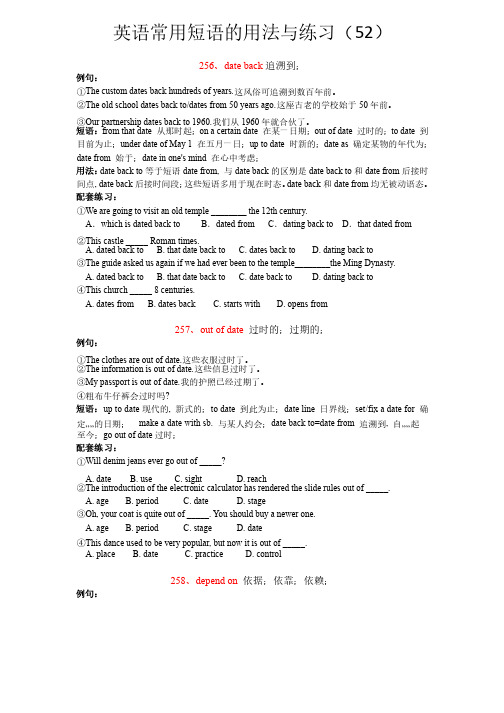
英语常用短语的用法与练习(52)256、date back追溯到;追溯到;例句:①The custom dates back hundreds of years.这风俗可追溯到数百年前。
这风俗可追溯到数百年前。
年前。
②The old school dates back to/dates from 50 years ago.这座古老的学校始于50年前。
年就合伙了。
③Our partnership dates back to 1960.我们从1960年就合伙了。
短语:from that date 从那时起;on a certain date 在某一日期;out of date 过时的;to date 到目前为止;under date of May 1 在五月一日;up to date 时新的;date as 确定某物的年代为;date from 始于;date in one's mind 在心中考虑;在心中考虑;用法:date back to等于短语date from, 与date back的区别是date back to和date from后接时间点, date back后接时间段;这些短语多用于现在时态。
date back和date from均无被动语态。
配套练习:①We are going to visit an old temple ________ the 12th century.A.which is dated back to B.dated from C.dating back to D.that dated from②This castle _____ Roman times.A. dated back toB. that date back toC. dates back toD. dating back to③The guide asked us again if we had ever been to the temple________the Ming Dynasty.A. dated back toB. that date back toC. date back toD. dating back to④This church _____ 8 centuries.A. dates fromB. dates backC. starts withD. opens from257、out of date 过时的;过期的;例句:这些衣服过时了。
英语常用短语的用法与练习(3)
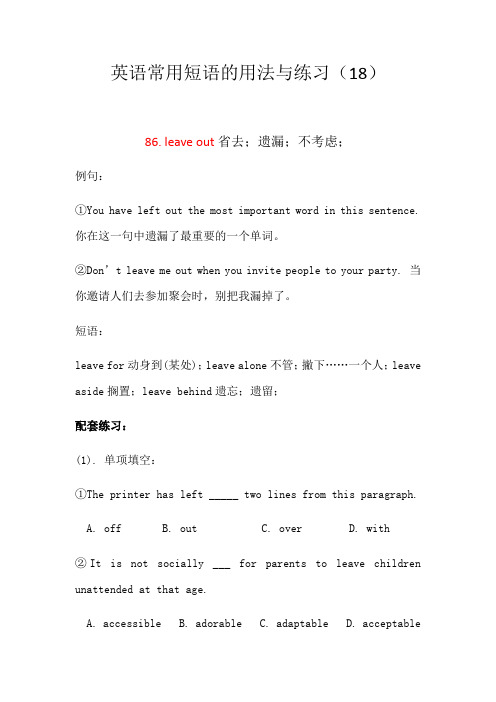
英语常用短语的用法与练习(18)86. leave out省去;遗漏;不考虑;例句:①You have left out the most important word in this sentence. 你在这一句中遗漏了最重要的一个单词。
②Don’t leave me out when you invite people to your party.当你邀请人们去参加聚会时,别把我漏掉了。
短语:leave for动身到(某处);leave alone不管;撇下……一个人;leave aside搁置;leave behind遗忘;遗留;配套练习:(1). 单项填空:①The printer has left _____ two lines from this paragraph.A. offB. outC. overD. with②It is not socially ___ for parents to leave children unattended at that age.A. accessibleB. adorableC. adaptableD. acceptable③I’ll be glad for you to leave me alone. I surely will. It’s none of my ___.A. affairsB. businessC. matterD. events④It’s better to call the children inside, it’s cold. Just ___. They are all enjoying themselves.A.leave them there where they areB. let them aloneC. leave them lonelyD. left them where they are(2). 用适当的介词或副词填空:①They were left _____ in the wilderness.②He was asked to make up the information left _____ by the leader.87. let out发出;放走;泄露例句:①Every time she moved her leg, she let out a moan. 每次她动一下腿,就会发出一声呻吟。
practise的短语和例句
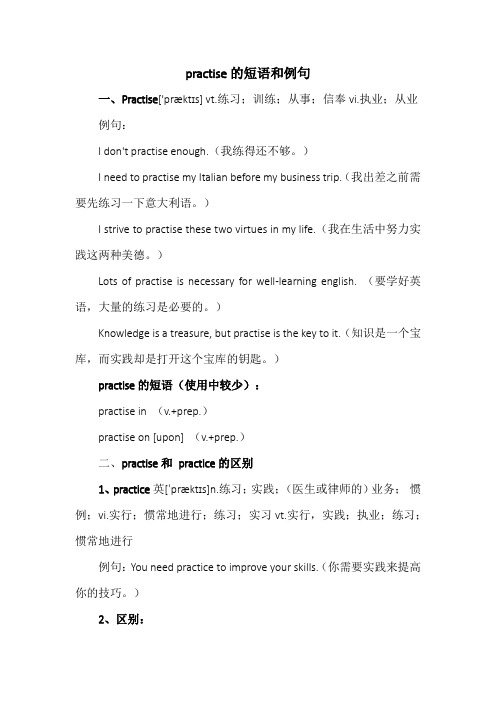
practise的短语和例句一、Practise['præktɪs] vt.练习;训练;从事;信奉vi.执业;从业例句:I don't practise enough.(我练得还不够。
)I need to practise my Italian before my business trip.(我出差之前需要先练习一下意大利语。
)I strive to practise these two virtues in my life.(我在生活中努力实践这两种美德。
)Lots of practise is necessary for well-learning english. (要学好英语,大量的练习是必要的。
)Knowledge is a treasure, but practise is the key to it.(知识是一个宝库,而实践却是打开这个宝库的钥匙。
)practise的短语(使用中较少):practise in (v.+prep.)practise on [upon] (v.+prep.)二、practise和practice的区别1、practice英[ˈpræktɪs]n.练习;实践;(医生或律师的)业务;惯例;vi.实行;惯常地进行;练习;实习vt.实行,实践;执业;练习;惯常地进行例句:You need practice to improve your skills.(你需要实践来提高你的技巧。
)2、区别:(1)practice有两种词性,一种是名词(.n),一种是动词(.v),都是“练习”的意思。
(2)practise只有动词词性,用法和意思与practice相同,所以一般情况下用practice代替practise。
三、practice 的常用短语(用作名词):1、in practice在实践中例句:It's important to keep in practice.(经常练习很重要。
英语常用短语的用法与练习

英语常用短语的用法与练习(1)1. above all首先;尤其;最重要的是;例句:①We have all but finished the work.②The day turned out fine after all.③Children need many things ,but above all they need love.④He wasn't at all tired.⑤Do you feel ill at all(真的,确实)?⑥There were twenty in all at the party.⑦Never waste anything, and above all, never waste time.不要浪费东西,尤其是不要浪费时间。
短语:above all是从事物的重要性上说的“首先,最重要的是”。
first of all 是从事物的排列顺序上说的“第一”。
in all表示“总共;总而言之”。
after all表示“毕竟”。
all in all 从各方面考虑;总的来说;not at all 不用;all long 一直,始终;all but 几乎,差点没(=almost,nearly)配套练习:单项填空①—Would you like to see a film with me?—I’d love to, but I cannot; ____ , I am busy. For another, I don’t want to go out today.A. for one thingB. for exampleC. for another thingD. above all②I'd like to buy a house -- modern, fortable, and ____ in a quiet neighborhood.A. in allB. above allC. after allD. at all③In order to continue to learn by ourselves when we have left school, we must ____ learn how to study in the school now.A. in allB. after allC. above allD. at all④I’d like buy a house --- modern, fortable, and _____ in a quiet neighborhood.A. in allB. above allC. after allD. at all2. by accident = by chance偶然;无意中;不小心;用法:by accident,其意为“偶然地”“无意地”,主要用作状语,有时也用作表语。
初中英语常用的介词短语
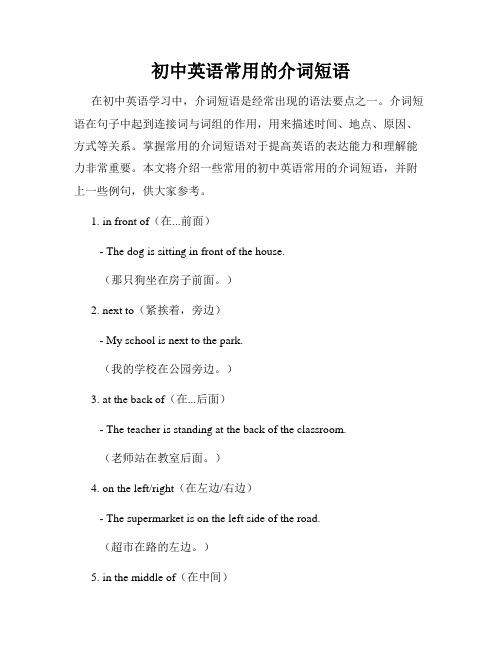
初中英语常用的介词短语在初中英语学习中,介词短语是经常出现的语法要点之一。
介词短语在句子中起到连接词与词组的作用,用来描述时间、地点、原因、方式等关系。
掌握常用的介词短语对于提高英语的表达能力和理解能力非常重要。
本文将介绍一些常用的初中英语常用的介词短语,并附上一些例句,供大家参考。
1. in front of(在...前面)- The dog is sitting in front of the house.(那只狗坐在房子前面。
)2. next to(紧挨着,旁边)- My school is next to the park.(我的学校在公园旁边。
)3. at the back of(在...后面)- The teacher is standing at the back of the classroom.(老师站在教室后面。
)4. on the left/right(在左边/右边)- The supermarket is on the left side of the road.(超市在路的左边。
)5. in the middle of(在中间)- The cat is sleeping in the middle of the bed.(猫正在床的中间睡觉。
)6. between...and...(在...和...之间)- The library is between the school and the post office.(图书馆在学校和邮局之间。
)7. at the corner of(在...的拐角处)- The bakery is at the corner of the street.(面包店在街的拐角处。
)8. near(在附近)- There is a park near my house.(我家附近有一个公园。
)9. across from(在...的对面)- The hospital is across from the supermarket.(医院在超市的对面。
英语常用短语的用法与练习(4)

英语常用短语的用法与练习(6)26. build up逐步建立;逐渐增强;加强;树立;积累;例句:①The company has built up a fine reputation. 该公司已建立起良好的信誉。
②You must build up your strength after your illness. 你在病后必须要增强体力。
build短语:build up from nothing 白手起家;build up to vt.增加到;build one's body强身健体;build on the rock of稳固地建立在…的基础上;build on sand根基不稳;build on建立在…的基础上;build in安装,固定;build a reputation as逐渐赢得…的声誉;配套练习:(1).完成句子:①我们应该鼓励孩子们树立信心。
We should encourage the children to _____ .②看到你的词汇量在逐渐增长我很高兴。
I’m very glad to see that your vocabulary is _______ .(2).单项填空:①He went to live in the country and soon ___ his body.A. set upB. built upC. grew upD. kept up②Bears ______ fat stores throughout the summer and fall to have energy enough to last them through their winter sleep.A. pack upB. build upC. bring upD. take up③Clouds are building up over the sea.up up building up bringing up④Good food builds up the body.up B.builds on C.builds in up27. burn ...to the ground (楼房等)被(全部)烧毁;全部焚毁;例句:①He has no place to live in because his house has been burnt to the ground. 他无处栖身,因为他的房子被烧掉了。
- 1、下载文档前请自行甄别文档内容的完整性,平台不提供额外的编辑、内容补充、找答案等附加服务。
- 2、"仅部分预览"的文档,不可在线预览部分如存在完整性等问题,可反馈申请退款(可完整预览的文档不适用该条件!)。
- 3、如文档侵犯您的权益,请联系客服反馈,我们会尽快为您处理(人工客服工作时间:9:00-18:30)。
英语常用短语的用法与练习(1)1. above all首先;尤其;最重要的是;例句:①We have all but finished the work.②The day turned out fine after all.③Children need many things ,but above all they need love.④He wasn't at all tired.⑤Do you feel ill at all(真的,确实)?⑥There were twenty in all at the party.⑦Never waste anything, and above all, never waste time.不要浪费东西,尤其是不要浪费时间。
短语:above all是从事物的重要性上说的“首先,最重要的是”。
first of all 是从事物的排列顺序上说的“第一”。
in all表示“总共;总而言之”。
after all表示“毕竟”。
all in all 从各方面考虑;总的来说;not at all 不用谢;all long 一直,始终;all but 几乎,差点没(=almost,nearly)配套练习:单项填空①—Would you like to see a film with me?—I’d love to, but I cannot; ____ , I am busy. For another, I don’t want to go out today.A. for one thingB. for exampleC. for another thingD. above all②I'd like to buy a house -- modern, comfortable, and ____ in a quiet neighborhood.A. in allB. above allC. after allD. at all③In order to continue to learn by ourselves when we have left school, we must ____ learn how to study in the school now.A. in allB. after allC. above allD. at all④I’d like buy a house --- modern, comfortable, and _____ in a quiet neighborhood.A. in allB. above allC. after allD. at all2. by accident = by chance偶然;无意中;不小心;用法:by accident,其意为“偶然地”“无意地”,主要用作状语,有时也用作表语。
例句:①Last time I ran across her in the street by accident. 上次我偶然在街上碰见她了。
②I only found it by accident. 我只是碰巧找到的。
③None of my inventions came by accident. 我所有的发明都不是偶然的。
by短语:by contrast 对比之下;by mistake 错误地;by hand 用手;用体力;by machine 用机器;配套练习:(1).用“by+n.”构成的短语填空:①I was in such a hurry that I took someone else’s umbrella ______ .②These toys are made ______ instead of _______ , so they are very expensive.③She had found the file ________ .(2).单项填空①Last Sunday I met my first teacher by _____ in a minibus, which is beyond my expectation.A. chanceB. farC. effectD. way②An artist who was recently traveling on a ferry to the southern islanddiscovered ______ a long lost antique Greek vase.A. at randomB. by chanceC. in turnD. on occasion③If by any chance someone comes to see me, ask them to leave a _____ .A. messageB. letterC. sentenceD. notice④Sorry, I took your pen _____.A. by heartB. by mistakeC. on purposeD. by the way3. accuse ...of... 因……控告/指责……;用法:accuse的宾语后接of,介词的宾语表示指责或指控的具体内容。
如:accuse sb of carelessness指责某人粗枝大叶;后接复合宾语,宾补由介词as引出。
如:They accused his brother as Smith’s accomplice(帮凶);常用于被动结构中。
如:Of what was the man accused?例句:①I don’t thi nk anyone can accuse him of not being frank. 我看谁也不能说他不坦率。
②You can’t accuse Stephen of robbing the bank. He was round at my house all evening. 你不能控告斯蒂芬打劫银行,他整晚都在我家。
辨析:accuse/chargeaccuse, charge这两个动词都有“控诉,指控”之意,但它们后面所搭配的介词不同。
accuse v.指控,控诉,常与介词of连用。
charge v.可以指因为小错而受的责备,也可指因违法而受到控告,与介词with连用。
配套练习:单项填空①Tom ___ his boss of having broken his word.A. blamedB. accusedC. chargedD. scolded②The policeman stopped him when he was driving and ___ him ofA. chargedB. accusedC. blamedD. scolded③The soldier was ___ of running away when the enemy attacked.A. scoldedB. chargedC. accusedD. punished④It wasn’t my fault. Don’t worry! I wasn’t ___ you.A. conveyingB. referringC. hearingD. accusing⑤The policeman stopped him when he was driving home and ____ him of speeding.A. warnB. accusedC. chargedD. deprived4. be addicted to对……上瘾;入迷;沉溺于(其中to为介词);addict vt.使……成瘾;addict n. [C] 入迷的人;有瘾的人;addictive adj.使成瘾的;上瘾的;addiction n.沉溺;成瘾;上瘾;入迷;例句:①Schoolboys are easier to be addicted than schoolgirls to net. 男生比女生更容易上网成瘾。
②He was addicted to cocaine. 他吸可卡因上瘾。
③He was addicted to gambling. 他赌博成瘾。
addict短语:be addicted to sth./doing sth. = addict oneself to sth./doing sth. 沉溺于某种嗜好;醉心于某种活动配套练习:①Her husband is so ___ to smoking that he can’t give it up.A. addictingB. addictiveC. addictedD. addiction②The parents felt helpless when they found their son had ___ love stories for long.A. addictB. addictedC. been addicted toD. addicted himself③She says she’s unable to give up smoking; she’s completely ___.A. addictingB. being addictedC. addictedD. having addicted④I shouted at him, but he couldn’t hear me. He ___.A. was addicted to readB. became addicted to readingC. became addict to readingD. was addicted in reading⑤Although she is only 17 years old, she ____ drugs for two years.A. AddictsB. has addicted toC. has addictedD. has been addicted to5. in addition (常与to连用)此外;用法:in addition是介词短语,作副词用,相当于词组as well,其后不能跟名词或其他任何成分,一般位于两个句子中间或置于句末。
位于两个句子中间时,常用逗号与句子隔开。
in addition to是介词短语,其后接名词或代词等作其宾语,意义大体相当于as well as和besides。
①There are many shops around the railway station. In addition, there are some newly built hotels there. 火车站附近有很多商店,此外,那里还有一些新建的旅馆。
